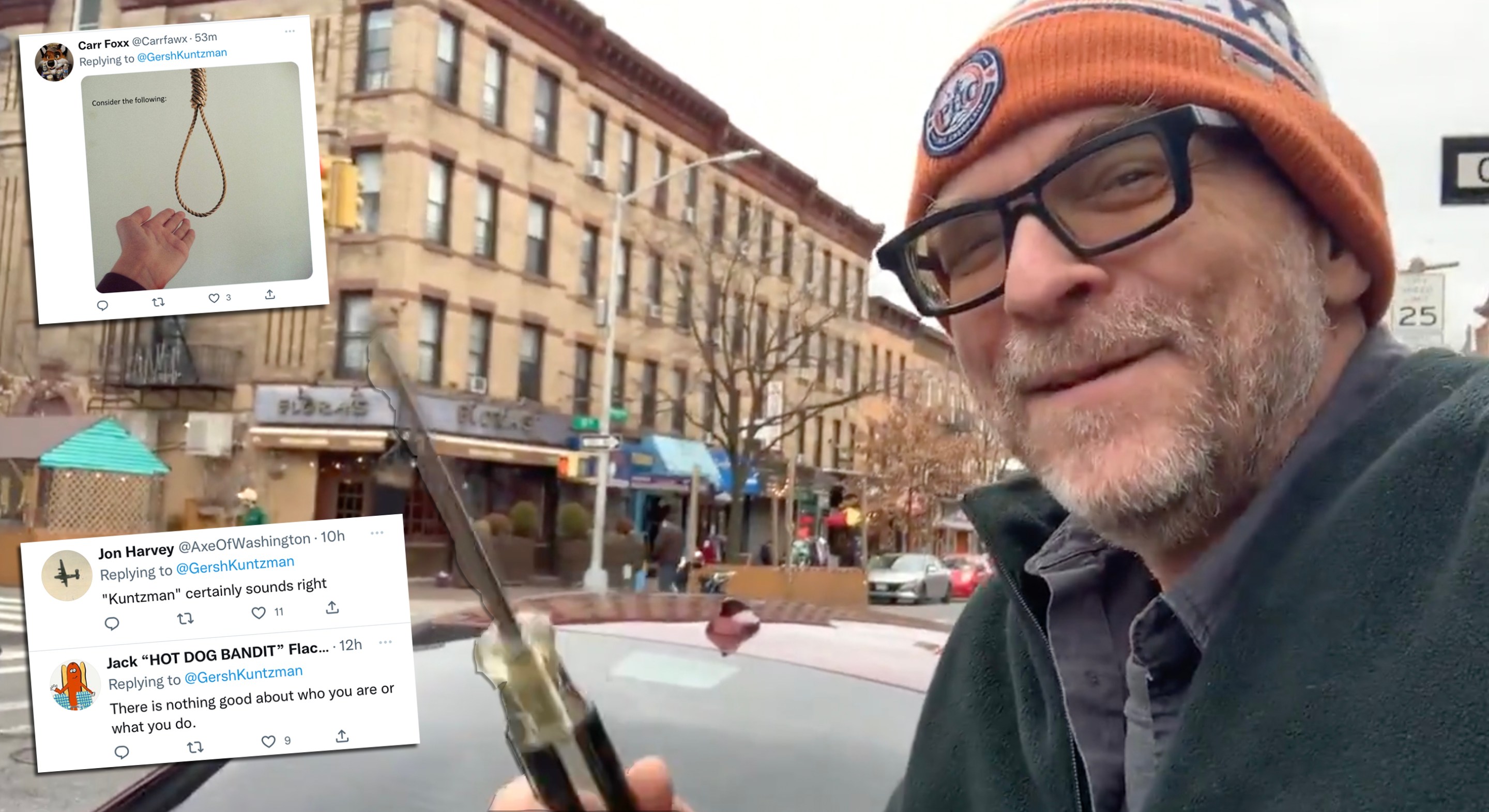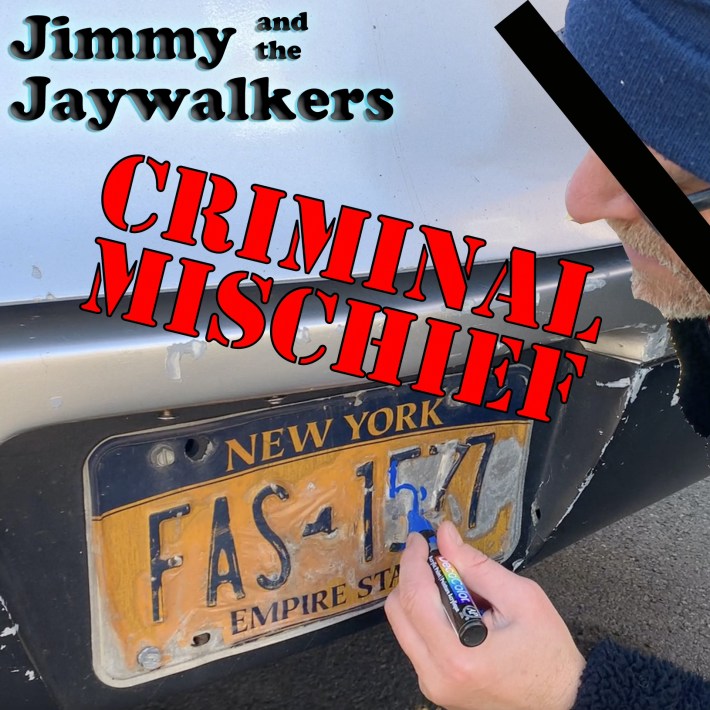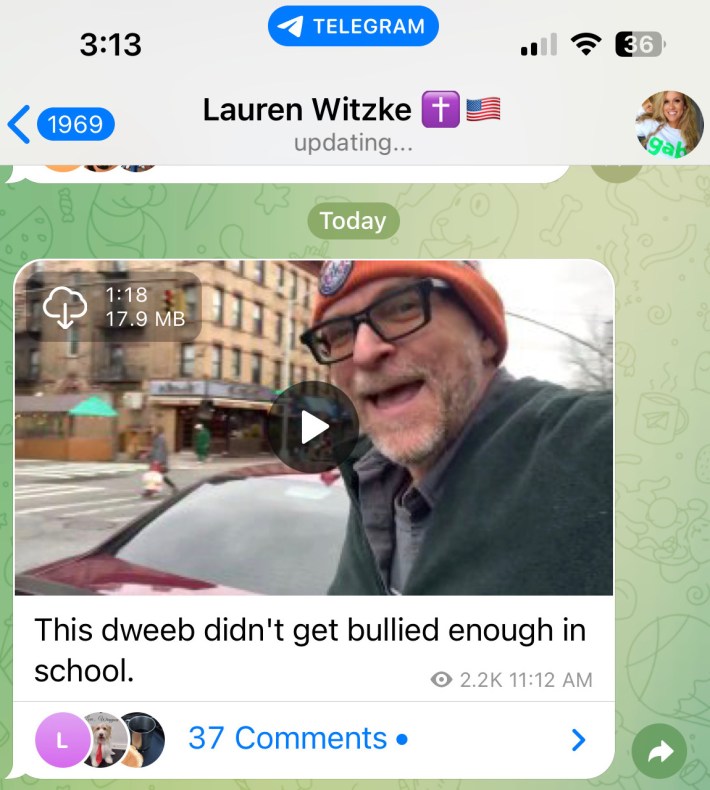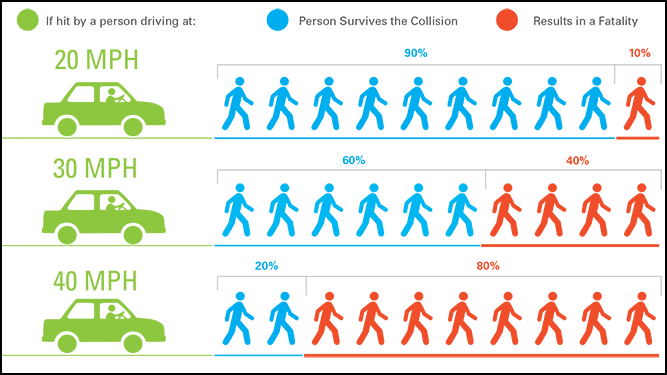It’s time to hang up the paint pen and screwdriver.
I’ve been biking around town for about three months fixing intentionally defaced license plates, peeling off tape that’s obscuring a number or letter, and removing illegal covers — and garnered lots of media attention for my (apparently) life-threatening exploits: Gothamist, NY1, the New York Times and even the vaunted New Yorker have found my campaign to rein in reckless drivers worthy of attention.
Yet from City Hall and at 1 Police Plaza? Crickets.
And that’s embarrassing — for the mayor and the police commissioner. Since my first “criminal mischief” video on Nov. 15, I’ve now caught 59 police officers, firefighters and other law enforcement personnel doctoring their plate to avoid speed or toll cameras (here’s a list of all the miscreants with links to my videos). The NYPD has long said it disciplines officers who misuse their department-issued placard or deface their plates, but the agency declined to comment when I sent it a list of defaced plates I caught (I’ve submitted a Freedom of Information Law request for the disciplinary records — see FOIL-2023-056-01709 — so we’ll see what happens).
I also reached out to City Hall — which, frankly, should be issuing me a proclamation — but didn’t hear back yet.
Perhaps everyone in Officialdom hopes this issue will just go back under the carpet.
But I couldn’t let it. At Streetsblog, we’ve obviously been covering vehicular malfeasance by public officials for years, but it wasn’t until lawyer Adam White was arrested (and charged with “criminal mischief”) for repairing an intentionally damaged plate that our movement for safety merged with social media to create a made-for-Twitter juggernaut (plus, the catchy theme song I wrote for Jimmy and the Jaywalkers didn’t hurt, either).
Like all great ideas, this one started with something dumb: I figured if Adam White could get arrested and charged with “criminal mischief” for literally doing the opposite of causing damage to someone’s property, I should probably fan out all over town and try to get arrested, too! And maybe more people would do it, and then, as Arlo Guthrie said, we’d have a movement. (It’s ultimately unclear if White and I have committed any crimes — I was never arrested and his case was dropped by the Brooklyn District Attorney. But Streetsblog freelancer Joseph Tedeschi, who is a lawyer, did some research and found plenty of legal eagles who think it is a crime to take matters into one’s own hands, even though license plates are definitely state property, not the car owner’s property.)
My earliest posts tagged the local precinct where I was committing the alleged crime, in hopes that someone would either arrest me or, better still, come out and do my job for me:
CRIMINAL MISCHIEF doesn't take a weekend off. The @NYPD78Pct needs to arrest this mischief maker on Prospect Park West — and fast, before he mischiefs again! (Context: https://t.co/OW9MXZeOCa) pic.twitter.com/x5xZEdNWqX
— Gersh Kuntzman (@GershKuntzman) November 26, 2022
This hearse was one of my favorites (and includes a rare aural appearance by Jimmy):
Hey @NYPD72Pct we have some CRIMINAL MISCHIEF going on on Fourth Ave! Arrest? pic.twitter.com/E93mgvSYRS
— Gersh Kuntzman (@GershKuntzman) November 19, 2022
We all know what happened next, though perhaps only Elon Musk’s algorithm writer can explain why the public started lapping up videos of an old man biking around with a paint pen and a screwdriver meting out justice that the city’s law enforcement officials didn’t care about (and likely never will, given how many of them are committing the crime!).
After that came the big fishes: the many many people in law enforcement whom I’ve caught defacing their plates. There was that time I caught a former NYPD hostage negotiator (now working for the Manhattan District Attorney) who had used tape to turn a letter “E” into a letter “F”:
One last INCREDIBLE episode of CRIMINAL MISCHIEF today, featuring an ex- @NYPDDetectives negotiator now working for (and getting a placard from!) @ManhattanDA Alvin Bragg. This guy SO DISCRETELY covered his plate that you almost want to tip your hat (except that he's a perp). pic.twitter.com/nGOHUhB9w7
— Gersh Kuntzman (@GershKuntzman) January 7, 2023
That guy ended up being fired!
Then there was the time I used my screwdriver to remove illegal covers from a supposed Sanitation Department employee’s car and from a court officer’s car:
Today I spotted a guy with BOTH plates covered, plus an NYPD sticker and an EXPIRED (and probably fake) @NYCSanitation placard AND an expired inspection sticker — so I did what anyone would do: commit CRIMINAL MISCHIEF! pic.twitter.com/5R35ySoj3u
— Gersh Kuntzman (@GershKuntzman) December 31, 2022
Let's close out the day with some serious CRIMINAL MISCHIEF on Schermerhorn St. in @NYPD84Pct, where today we found a @NYSCourtsNews officer who stopped getting tickets a year ago — perhaps when he installed this illegal plate cover? Well, I helped him out, big time. pic.twitter.com/MzV8WggwKC
— Gersh Kuntzman (@GershKuntzman) January 6, 2023
And who could forget the fun I had just repainting the defaced digits from this Fifth Precinct cop’s car?
Before we kick off the week, how about some awesome CRIMINAL MISCHIEF against a cop from @NYPD5Pct who should be enforcing the law not breaking it. Well, now he's safe because I repainted his plate for him. You're welcome, @nypdpc Sewell — now there's 1 less cop to discipline. pic.twitter.com/5sZ0D8meB0
— Gersh Kuntzman (@GershKuntzman) January 9, 2023
No one video tells the full story, but taken together, the videos reveal a pattern of low-level corruption that continues simply because so little is done to stop it.
In 2021, the NYPD issued just 7,781 tickets between Jan. 1 and Oct. 30 for covering, defacing or sullying a plate so that it could not be read. Last year over the same period, that number dropped to 6,209 tickets, or a 20-percent decline. That decline is especially alarming given that the number of people defacing plates seems to be on the rise.
According to a seminal report by Reuven Blau in The City, Department of Transportation speed cameras typically could not read about 1 percent of the license plates that passed them by. But starting in late 2019 — when the number of speed camera systems expanded for the first time — and again in mid-2020 when the number of camera systems reached 750, the number of plates that were unreadable jumped to nearly 5 percent. (The City’s numbers were complete through the end of 2021; the Department of Transportation has not provided Streetsblog with the updated numbers, despite numerous requests.)
If 5 percent of vehicles cannot be caught on school-zone speed cameras, that’s a pretty serious safety threat — especially considering that the cameras only issue a ticket if a driver exceeds the speed limit by 11 miles per hour or more.
It’s also a lot of lost revenue: From Aug. 1 to the end of 2022, the city issued 3,088,171 speed camera tickets. If just 4 percent of offenders’ plates can’t be read, that would mean another 123,500 tickets were not issued. At $50 a pop, the city lost close to $6.2 million, just over those five months. For the whole year, it’s nearly 230,000 unable-to-be-issued tickets, or $11.5 million.
Like the DOT, the MTA said that about 1 percent of its toll transactions were foiled by unreadable plates in the past. As Streetsblog reported, a Freedom of Information request by journalist Steven Bodzin revealed that cameras failed to pick up 118,464 license plates out of 9,286,640 toll transactions between March and September 2018 because they were either unintentionally or intentionally obscured.
But if the MTA has experienced the same increase in unreadable plates as the DOT has, the agency is losing even more than the scores of millions of dollars in toll revenue it was losing back then. That’s revenue that maintains the transit system.
So, yes, I repaint or uncover unreadable plates. I do it unapologetically.
And everything was going fairly well. Until this week, when right-wing influencer and QAnon adherent Lauren Witzke posted on Telegram that I was a dweeb (guilty as charged) who should be bullied for what I’m doing (wait, wut now?).
And so began the fairly typical right-wing pile-on featuring thousands of people who have probably never once engaged with the topic of street safety, car harms, road violence or Vision Zero deciding that a guy trying to present drivers from racing through speed zones is just another lib they need to own.
The irony, of course is that “criminal mischief” post to which Witzke linked was the one where I’d hoped to begin a pivot to simply highlighting scofflaws without actually committing “criminal mischief” against their sacred cars.
Clearly, Witzke has a classy audience:
i’d kick you so hard in the balls they’d finally start working if you did this to my car
— RachelShloer (@RachelShloer) January 24, 2023
And how about this one:
Oh if I seen you doing this to my car I would shove that screwdriver up your balloon knot.
— IllNameThisProfileLater (@DerockTheGod) January 24, 2023
The tweet above was mild. Other threats that can be printed in a family website included, “Show us on the doll where the rabbi touched you,” “the Austrian painter was right” and “You should get a Glasgow smile.”

On social media, of course, people are quick to threaten violence … and issue other threats that make no sense or were outright contradictory. But the cognitive dissonance on the Right still amazes: Some accused me of being a Nazi, while others openly hoped that the Nazis would take me out (images include jackboot lollipops and nooses). Everyone, apparently, is for law and order … unless a Jewish liberal from New York is trying to bust the lawbreakers.
Believe me, when you have a name that sounds like a Muppet in a porno movie, and you’ve had a career of taking controversial positions for as long as I have, you get used to (and, indeed, bored by) online mockery. But even the trolls make a good point (not that they’re aware of it): there is a very large constituency of people who are offended when their criminal behavior is pointed out and corrected.
Still, it’s a bad sad that people want to beat up a guy on a mission is to reduce the likelihood that people will speed through school zones with impunity, perhaps hitting someone else’s kid. (Reminder: a person struck by a driver going 20 miles per hour has a 90-percent chance of surviving, a figure that drops to just 20 percent if the person is struck by a driver going 40.)
So that’s why it’s time for this campaign to move from the active pen-and-screwdriver phase to the next step: the political elite and law enforcement apparatus of this city actually getting involved and doing something rather than merely be embarrassed day in and day out by an old man taunting our car-driving overlords.
I’ve done my part; my exploits have earned me the ultimate honor of the non-profit journalism world: Council Transportation Committee Chair Selvena Brooks-Powers has publicly announced on Twitter that “there will be a hearing on obscured plates,” though she hasn’t set a date and has declined to talk to me about it, despite several requests.
Hi Carla, responding from my Council Twitter handle. Please use this handle for Council related matters. There will be a hearing on obscured plates. Date has not been confirmed yet. Hope you are available to testify. https://t.co/Lq67FF9QHw
— CMSelvenaBrooksPowers (@CMBrooksPowers) January 18, 2023
After the Council hearing, perhaps City Hall will actually crack down on scofflaws in their midst. Perhaps the NYPD’s 77 precincts will issue more than one defaced plate ticket every five days on average. Or maybe the Council will expand Lincoln Restler’s Intro 501 — which seeks to allow the public to report illegal parking and other driver misconduct via 311 and get a portion of the resulting ticket revenue — to include instances of covered or defaced plates. Such a move would go a long way towards holding drivers accountable yet not forcing members of the public to risk personal injury by actually repairing or re-uncovering defaced plates.
Because as Twitter is telling me, I’m too old for this shit. (Besides, I’m singing a whole new song now.)
UPDATE: After initial publication of this story, a City Hall spokesperson — who declined to put his or her name on it — sent over this statement:
Obscuring and defacing license plates is against the law. Under the Adams administration, New York City has been a leader in expanding automated traffic enforcement and holding drivers accountable for illegal and reckless behavior — cracking down on "ghost vehicles," strengthening enforcement of the city’s law prohibiting the sale of ‘camera blockers,’ and towing thousands of vehicles with illegal plates last year. The relevant city agency will review each incident of alleged violations and evaluate them for potential disciplinary action.
That last sentence will be crucial, and I'll be following up.
Gersh Kuntzman is editor of Streetsblog. His prior “Cycle of Rage” columns are archived here.









